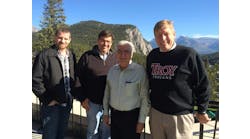Not Every Shadow Is an Alligator, Says ABB's CEO, Pointing to Opportunities Even in Bad Times
Joe Hogan, ABB’s CEO, says there’s light at the end of the present worldwide economic downturn tunnel, and that his company will help deliver the power and automation to produce it.
Hogan presented the opening keynote address on the first day of ABB Automation and Power World 2009 today at the Orlando World Center Marriott Resort and Convention Center in Florida. Hogan launched into his keynote by thanking the more than 3,200 attendees at ABB Automation and Power World for coming to the event.
“It’s great to see so many customers and partners here,” said Hogan. “It shows real commitment despite the tough economic times we’re going through now.” Hogan joined ABB in September 2008 after 23 years at General Electric, including stints leading GE Healthcare, GE Medical Systems and GE Fanuc.
“Every dark shadow isn’t an alligator.” ABB’s Joe Hogan attributed much of today’s economic doom and gloom to poor visibility.
Hogan reported that all of the world’s economies are under extreme economic pressure due to deficiencies and failures in the world’s banking systems and securitized credit markets. “This economy is affecting all of us, and so we’re going to have to approach business differently and work and share more closely,” explained Hogan. “Last week, we began to see some positive signs, including the U.S. government’s latest proposal on handling toxic assets.”
Until recently, Hogan reported that the worst economic downturn he had witnessed was in 1980-81. “However, the difference then was that the international economies weren’t cycling together,” he explained. “Now almost all of the world’s economies are seeing declines and reversals in gross domestic product (GDP). This is especially true in the Western Europe and North America, of course, but China and India also are seeing slowdowns in their growth. This common economic cycling shows how linked we all are and how much we need to cooperate with each other.”
Despite the worldwide economic downturn, Hogan added that several long-term trends that existed before the precipitate fall late last year will reassert themselves and continue after the recession has abated. Specifically, increasing demand for energy will return in force once global financial systems have stabilized.
“I was out running by the golf course and lakes here in the pre-dawn hours this morning, and I remembered hearing that there often are alligators in the water here in Florida and wondering if they come out at night,” said Hogan. “After that, I began to see alligators in every dark shadow. And because of the economic difficulties we’re facing now, I think many economists are seeing alligators everywhere instead of the euphoria they were experiencing previously. So, where they used to see unlimited growth, they now see the worst possible situation. I think neither of these is right.”
Hogan added, “When the credit systems are stabilized, the long-term trends will return, especially the world’s increasing demand for energy. As a result, we plan optimistically, and ABB will continue to invest optimistically. The stimulus plans being undertaken bode well to help prime the world’s economic pumps. The U.S. is still the largest economy in the world, and ABB will continue to invest and grow here too.”
Even though it’s a global company with 120,000 employees, Hogan added that ABB concentrates intensely on local operations, stays as close to its customers as possible, and strives to understand and meet local needs. In the U.S., ABB has 8,500 staffers, five local divisions, 42 factories, 100 service locations, a corporate R&D facility in Raleigh, N.C., and its process automation global headquarters in Houston.
“We present ourselves as problem solvers, and so we try to see our customers’ problems through their eyes. As a result, we help users stay competitive by controlling their costs with improved energy efficiency, improvements in productivity, integrated technologies, strong long-term partnerships and expansive service offerings,” said Hogan. “I think the automation field has progressed a lot since the last time I was in it 10 years ago. Both on the process and the discrete side, we’re seeing the former islands of automation being roped together.”
Hogan added that ABB also is assisting users to control their energy costs and emissions with wider application of its low- and medium-voltage drives and motors, high-voltage DC equipment and flexible AC transmission systems, and process automation solutions. For example, drives can reduce energy consumption by as much as 50% for motors running pumps, fans or conveyors, but less than 10% of motors worldwide are equipped with a variable-speed drive. Likewise, he added, there are now 4,500 of ABB’s 800xA sites worldwide, and that each is tailored to its own individual application. “These can result in huge cost savings and do something positive for the environment at the same time,” said Hogan. “The new U.S. government administration seems to be responsive to these efforts, and so these solutions should help users seeking increased efficiency and greener generation solutions.”
For example, he reported that Sweden’s largest copper mine recently used ABB’s technology to integrate its power and automation systems, visualize its whole plant, save I/O points and distribute control.
In addition, at Alabama-based Wise Alloys, ABB’s Full Service division recently set up a plant-wide center for continuous improvement. Wise is the third largest U.S. aluminum can sheet producer. Within 12 months, plant productivity increased by 20% and maintenance costs decreased by 10%.
Also, ABB’s Reliability Services helped to design a maintenance program for Canada-based VBNC’s greenfield nickel mining and concentrator site in Voiseys Bay, Labrador. Within three months, the VNBC facility achieved 90% of design capacity, which reportedly made it the most successful start-up and ramp-up of a greenfield site in mining history.
Finally, Hogan added that ABB also has successfully tested an 800 kV transformer and 6,400 MW capacity transmission system that will send power 2,000 km from Xiangiaba’s hydroelectric generation facility to supply 30 million users in Shanghai.
“This is a perfect example of how ABB is working with users to build the future together,” said Hogan. “It’s undeniable that we’re a big company, so we can produce efficiencies and costs of scale and give our customers access to the best talent in the world. However, being a big company also can interfere with some local relationships, and so we’re also committed to maintaining the enthusiasm, passion and personal feel of a small company.”
So when you think about it, who better than ABB to help generate some light and scatter a few fear-induced alligators at the end of a long, dark tunnel?



